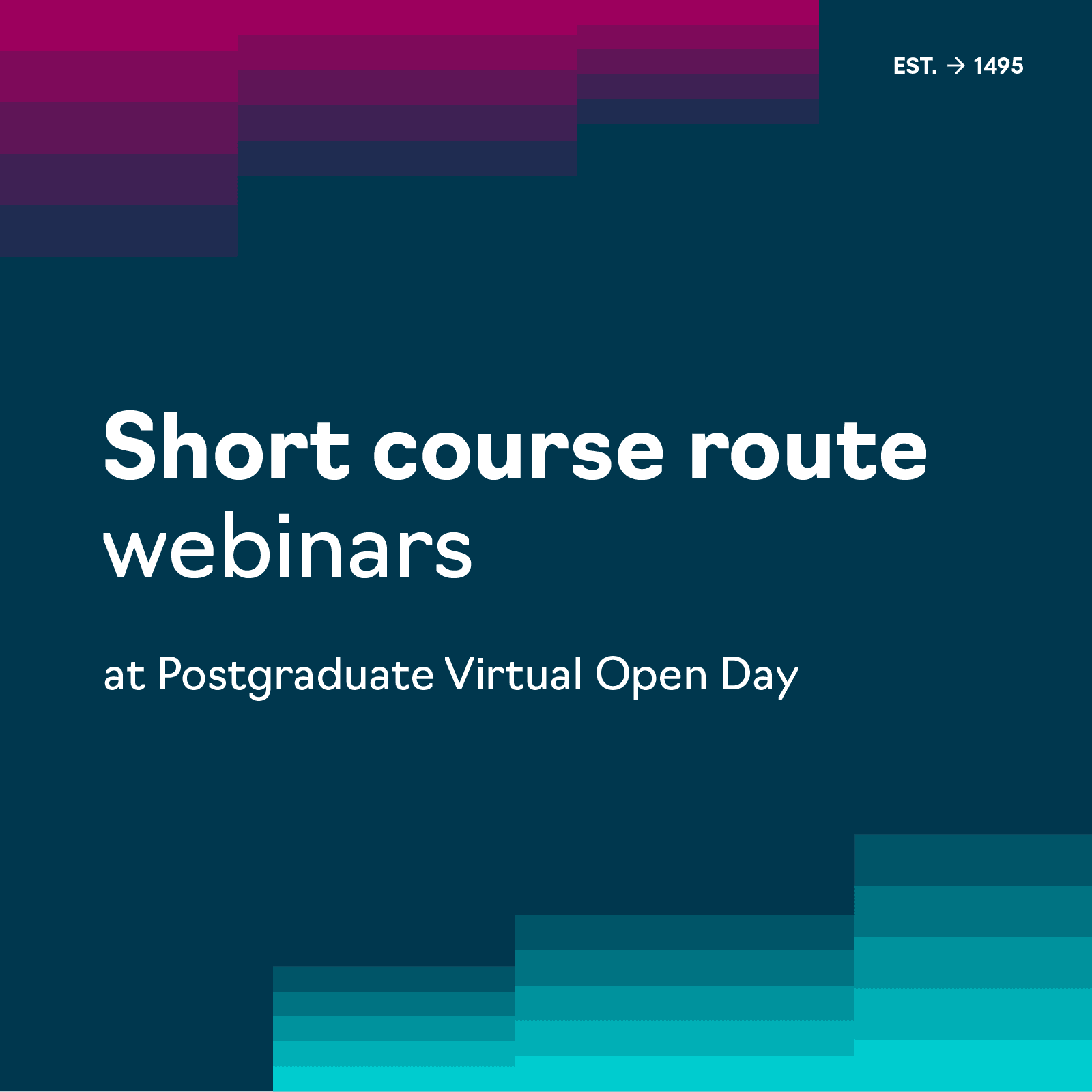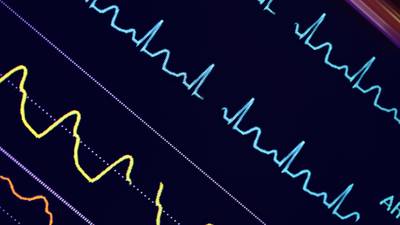Join an online public health course you can study flexibly, 100% online.
Public health is the art and science of improving health through the organised efforts of society.
In this Masters-level online short course:
- learn how to carry out your own rapid health needs assessment and impact public health for the better.
- gain a population-based perspective on health, illness and disease.
- learn from some of the UK’s leading public health scientists and researchers, based in our award-winning Institute of Applied Health Sciences.
Access their skills and teaching wherever you are in the world, with this flexible online course that fits around full-time work.

Build credits towards a Masters degree
This online course is part of:
You can use the credits you earn on this short course towards any of these postgraduate qualifications.

Join our short course route webinar
Interested in taking the short course route to a Masters or postgraduate qualification?
Join our online Postgraduate Virtual Open Day on Thursday 12 March.
We’ll be hosting two live webinars there, explaining how the short course route works and answering all your questions. See you there!
- Morning webinar: 10.50am (GMT)
- Evening webinar: 5.50pm (GMT)
What you’ll study
You’ll cover the three major areas of public health:
- Healthcare evaluation
- Health protection
- Health promotion
Within these, you’ll cover the core concepts of public health, including identifying populations at risk, monitoring public health, the burden of ill-health, effective intervention and health inequalities.
You’ll learn about the practical application of numerical ways of thinking about the health of populations. You’ll study health needs assessments and how they can be used to improve the health of a population in the context of its political, economic and social circumstances.
You’ll select a health needs assessment topic and carry out your own rapid health needs assessment, with step-by-step guidance from some of the best experts in this field.
By the end of this course, you’ll be able to…
-
Explain the relevance and contributions of health protection, health promotion and healthcare provision towards improving population health.
-
Locate, utilise, interpret and present data obtained from the major sources of information available to assess population health.
-
Integrate numerical data within the context of a health needs assessment, as a rational approach to improving public health.
-
Carry out a rapid health needs assessment and make recommendations to improve public health based on the best evidence available.
-
Communicate public health-related information effectively to a range of audiences in support of improving the health of a population.
Why study public health online with the University of Aberdeen?

1st in Scotland
We’re rated 1st in Scotland for Public Health, Health Services and Primary Care in the UK’s most recent Research Excellence Framework (REF 2021).

Real-world impact
Our work has changed clinical practice, policy, legislation and academic method, directly impacting the lives of millions of people.
Our research impact
Award-winning research
We’re proud winners of the Queen’s Anniversary Prize, the highest national honour for a UK university, for sustained excellence in health research over the last 40 years.
Why we were awarded the Queen’s Anniversary PrizeHow you’ll study
Online learning
Our distance-learning Public Health in Action course is delivered flexibly, 100% online. You can access our expertise wherever you are in the world and manage your study hours to suit you.
Your teaching
This course is taught at Masters level.
Your teaching is delivered through MyAberdeen, our online Virtual Learning Environment (VLE). It holds all the materials, tools and support you’ll need in your studies. Take a look around MyAberdeen.
You can access your learning materials on computer, smartphone and laptop, 24 hours a day. You’ll find a range of resources at your fingertips, including:
- recorded sessions
- videos
- discussion boards with classmates and tutors
- the online resources of our award-winning Sir Duncan Rice Library.
Your tutors
You’ll learn from an experienced team of clinical academics and public health practitioners from our Institute of Applied Health Sciences and NHS Grampian.
The course totals approximately 150 hours of study and assessment time. That’s around 10 – 15 hours per week.
This is an indicative guide to the time required for a typical student at this level to achieve the learning outcomes. This includes time for independent study, as well as teaching and assessments.
You can largely set your own study hours each week to cover the materials. MyAberdeen is available 24/7, so you can log in and study when it suits you.
Activities at fixed times
There may be some activities scheduled for fixed times. This could include coursework and assessments with deadlines, or online meetings with your tutor. Otherwise, you can access and work through the course at your convenience.
This course is assessed entirely online.
You’ll have three assessments to take online:
- A multiple-choice exam, based on material covered in the first eight weeks.
- A PowerPoint presentation.
- A written report.
Your presentation and written report will be based on the rapid health needs assessment you’ll carry out as part of your course.
All three assessments contribute to your final overall grade.
Our first-class support structure will ensure that you aren’t alone in your studies.
You’ll have contact with your coordinator via email, MyAberdeen, Microsoft Teams, or phone. You can use social media and discussion boards to chat with your fellow students too.
We provide a wide range of services to support you in your studies and beyond:
- Careers and Employability Service
- Disability support
- IT support
- Library support
- Student Support Service – help with finances, wellbeing and non-academic issues
- Student Learning Service – study support, with advice sessions available
- Aberdeen University Students’ Association (AUSA) – run by students for students
- Toolkit – clever apps and free training that can make your study life easier
Wherever you are in the world, you’ll feel part of our very special Aberdeen learning community.
Your course coordinator

Dr Leone Craig
Leone is a Lecturer in Applied Health Sciences. She holds a PhD in Nutrition and is passionate about improving diet quality around the world.
Leone has worked as a Scientific Advisor to the Food Standards Agency Scotland, and her research interests include comparing methods for the global assessment of diets.
View Leone’s profileWhere this will take you
Towards a Masters
You’ll earn 15 credits at Masters level (SCQF Level 11) with this course. You can use these credits towards our:

Masters in Applied Health Sciences
Fast-track your career in healthcare with our uniquely flexible MSc Applied Health Sciences. Study 100% online or combine with on-campus courses at our Foresterhill Health Campus. 10% discount for NHS staff.
View MSc Applied Health Sciences
Masters in Clinical Nutrition
Join an online Nutrition degree accredited by the Association for Nutrition. Study the link between diet and health, and how issues of over and undernutrition affect populations today. 10% discount for NHS staff.
View MSc Clinical Nutrition
Master of Public Health (MPH)
Join an online Master of Public Health (MPH) you can tailor to your career. Study with experts and choose from a wide range of courses to focus your training. 10% discount for NHS staff.
View Master of Public Health (MPH)Build your learning with more short courses
We have a range of online healthcare and medicine short courses you can use to earn in-demand skills.
Many carry credits you can build up into postgraduate qualifications, including Masters degrees:
Careers
Your employer or professional institute may recognise this course for Continuing Professional Development (CPD). Talk to your employer or institute to find out more.

Free career support
Access our free careers service while you study.
- 1:1 appointments
- CV checks
- Interview prep
- Job opportunities
Entry requirements
Entry requirements
We welcome students from all over the world.
This course has no formal entry requirements. You do not need to provide proof of your qualifications.
But you do need to check the entry guidance above to understand the level of teaching delivered, to decide if this course is right for you.
If you do not have qualifications from the UK, check the equivalent teaching level for your country.
Visa requirements
You do not need a student visa to study online with us.
English language requirements
Teaching is delivered in English.
You do not have to provide proof of your English language skills to join this course. But we want to make sure that you can use English well enough to study successfully.
Recommended level of English
This course uses our Postgraduate Higher level of English language proficiency.
These are our Postgraduate Higher requirements, and these are minimum scores.
IELTS Academic, IELTS UKVI Academic, or IELTS Online (not IELTS Indicator or IELTS General Training)
- 6.5 overall
- 5.5 for listening and speaking
- 6.0 for reading and writing
TOEFL iBT or TOEFL iBT Home Edition
- 90 overall
- 17 for listening
- 21 for reading
- 20 for speaking
- 21 for writing
- TOEFL DI code is 0818
Cambridge English: B2 First, C1 Advanced, or C2 Proficiency
- 176 overall
- 162 for listening and speaking
- 169 for reading and writing
LanguageCert Academic / LanguageCert Academic SELT
- 70 overall
- 60 for listening and speaking
- 65 for reading and writing
Oxford ELLT Digital – English Language Level Test Online
- 7.0 overall
- 5.0 for listening and speaking
- 6.0 for reading and writing
PTE Academic (online test not accepted)
- 62 overall
- 59 for listening, reading, speaking and writing
Skills for English: SELT
- B2 pass with merit
Duolingo – tests taken from 1 July 2024 onward
- 120 overall
- 95 for listening and speaking
- 105 for reading and writing
University of Aberdeen English Pre-sessional Programme (PSE)
- Pass
- Valid for one year. Refresher can be offered if out of date
Pre-sessional academic English preparation programmes undertaken at other UK universities
- Pass at an equivalent of 6.5 (C1)
- B2 in all four skills
- Certification must be within one year prior to the start of your course
For more information about language qualifications see our English Language Requirements page.
You will need access to:
A computer (PC, laptop or Mac) with an up-to-date operating system
Most teaching materials are smartphone- and tablet-friendly. But we recommend a proper laptop or desktop for completing assignments comfortably.
Reliable internet access
We recommend:
- a wired connection
- a minimum download speed of 2 Mbps so you can take part fully in live sessions.
Speakers or headphones
- We recommend a headset with built-in microphone and earphones if you’re likely to study in an environment with background noise.
- A webcam is optional, but you may like to use one for some interactive sessions.
Software
We’ll give you access to Office365 applications. This means you can use online versions of Microsoft Word, Excel, PowerPoint and OneDrive and install these programs on up to five personal devices.
If your course requires specialist software, we’ll provide you with access to this and a licence that lasts throughout your studies.
See our detailed IT requirements for more information.
When you study with us, you can expect a first-class support structure so that you’re never alone in your studies.
But learning online does mean you have to motivate yourself and manage your own time.
Your most important commitment will be time – the time to work through, reflect on and understand your teaching materials.
Before you start a course that involves a high degree of independent study, we recommend looking at the time you will be able to devote to your studies each week:
- Be realistic
- Create a weekly schedule as a guide
If you have any questions about studying online, get in touch with our friendly team. We’re here to help.
Fee payment
Your course fee needs to be paid in full before you start your course.
We accept payment via Visa Debit, Visa Credit and Mastercard.
Ways to save
You may be able to get help funding this course via:
- discounts – if any discounts are available for this course, they’ll appear in the section below
- employer sponsorship – we accept full and partial fee payments from sponsors.
Find out more about funding options.
Student card
All our students are entitled to a University of Aberdeen student card. This gives you access to a range of student discounts around the city and online.
This course has no formal entry requirements. You decide if it’s suitable for you.
The course is delivered at Masters level. At this level, you’d usually have at least:
- a 2:2 UK undergraduate degree (or equivalent), or
- relevant experience that supports this level of study.














